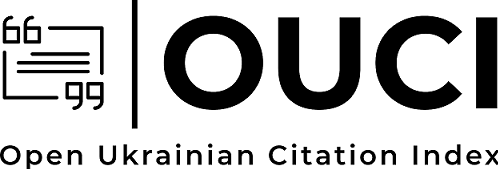Corporate and Personal Relations among the Literary Intelligentsia in the 1920s
DOI:
https://doi.org/10.28925/2524-0757.2023.28Keywords:
literary and artistic intelligentsia, writers, corporate connections, personal connections, Mykola Khvyliovyi, 1920sAbstract
The article examines the important issue of corporate and personal relations among the literary intelligentsia in the 1920s, which influenced significantly the development of not only the literary and artistic process but the course of the ideologization of cultural life in Soviet Ukraine as well. By examining the formation and confrontation of literary groups, the author investigates the consequences of the struggle in the intelligentsia’s environment. Besides, highlighting interpersonal relations, the author shows its influence on the results of the writers’ activity in the conditions of Ukrainization and pressure from the totalitarian state. The turbulent literary process in the 1920s was largely defined by the presence of various movements and groups in the USSR (Ukrainian Socialistic Soviet Republic) among literary figures. They waged a fierce, often destructive ideological struggle. The Bolshevik regime was able to give this struggle the character of an ideological confrontation and, consequently, to transfer it to the political area. Thus, in the conditions of totalitarian communist discourse the Soviet authorities got the opportunity to use this circumstance as a ground for political and physical destruction. At the same time, it was very difficult for the Bolshevik authorities to control horizontal corporate, and especially personal, ties. That is why the process of constant surveillance of literary and artistic figures was launched. The examples of H. Kosynka, M. Khvylovyi, and other writers show that this process was aimed not only at total control, but also at influencing the environment of cultural figures. This influence had an impact on the formation of an atmosphere of general fear and widespread distrust in the society of the cultural and artistic elite. And, as a consequence, the severance of horizontal ties, atomization and institutional weakening of the literary and artistic intelligentsia. It is determined that the Ukrainian literary and artistic intelligentsia in the paradigm of its own vision of the goals and objectives of Ukrainization, which were different from those of the governing Party, actually became a counter-elite for the Bolshevik party. This was the fundamental reason for the confrontation between the regime and the writers of the 1920s. Having used corporate and personal confrontation among writers, the Communist Party soon began to destroy intellectuals in Soviet Ukraine.
Downloads
References
Bon, O. (2021). «V tsiomu zapamorochlyvomu prysmerku nashoi — ne svoiei — stolytsi» (Mykola Khvyliovyi u spohadakh Oleksy Varavvy) [“In this amazing dawn of our — our lost — capital” (Mykola Khvyliovyi in Oleksa Varavva’s memoirs)]. Biographistica Ukrainica, 22, 138–150 [in Ukrainian]. https://doi.org/10.15407/ub.22.138
Bon, O. (2021) A. Humanitarna intelihentsiia Kharkova 1920-kh rokiv v eho-dokumentakh pysmennyka Oleksy Varavvy (Kobtsia) [Kharkiv Humanitarian Inteligence of 1920s in Ego-Documents of the Writer Oleksa Varavva (Kobets)]. Kyiv Historical Studies, 1(12), 167–173 [in Ukrainian]. https://doi.org/10.28925/2524-0757.2021.119
Danylenko, V. M. (Ed.). (2012). Ukrainska intelihentsiia i vlada: Zvedennia sekretnoho viddilu DPU USRR 1927–1929 rr. Kyiv: Tempora [in Ukrainian].
Halchenkо, S. A. (Ed.). (2020). Ostap Vyshnia. Nevesele zhyttia: dokumentalna. Kharkiv: Folio [in Ukrainian].
Lutskyi, Yu. (2000). Literaturna polityka v radianskii Ukraini 1917–1934. Kyiv: Helikon [in Ukrainian].
Meis, D. (2018). Komunizm ta dylemy natsionalnoho vyzvolennia: Natsionalnyi komunizm u radianskii Ukraini, 1918-1933. Kyiv: Komora [in Ukrainian].
Novak, A. (2021). Yak postavala «imperiia zla»? Dosvid Tsentralno-Skhidnoi Yevropy. Kyiv: Dukh i Litera [in Ukrainian].
Prymachenko, Ya. (2015). Diiachi literatury i mystetstva v poli zoru dyktatury. In Suspilstvo i vlada v radianskii Ukraini rokiv nepu (1921–1928), Vol. 2, pp. 57–133 [in Ukrainian].
Shapoval, Yu. (Ed.). (2009). Poliuvannia na «Valdshnepa». Rozsekrechenyi Mykola Khvylovyi. Naukovodokumentalne. Kyiv: Tempora [in Ukrainian].
Shkandrii, M. (2015). Modernisty, marksysty i natsiia. Ukrainska literaturna dyskusiia 1920-kh rokiv. Kyiv: Nika-Tsentr [in Ukrainian].
Yakubova, L. A. (2021). “Natsionalna za formoiu, sotsialistychna za zmistom»: ukrainska kultura v labetakh bilshovytskoi ideolohii”. In Vyprobovuiuchy doliu, hartuiuchy voliu. Ukraina y ukraintsi v 20 na pochatku 21 st. (Vol. 1, pp. 547–573) [in Ukrainian].
Yakubova, L. A. (2021). Natsionalne pytannia: bilshovytski retsepty. In Vyprobovuiuchy doliu, hartuiuchy voliu. Ukraina y ukraintsi v 20 na pochatku 21 st. (Vol. 1, pp. 500–546) [in Ukrainian].
Yefimenko, H. (2017). Horyzontalni zviazky yak nebezpeka dlia komunizmu ta «korinna zmina polityky vid ukrainizatsii do radianizatsii» (1920–1922 rr.). In Ukraina radianska. Iliuzii ta katastrofy “omunistychnoho raiu”, pp. 263–273 [in Ukrainian].
Yefremov, S. (1997). Shchodennyky, 1923–1929. Kyiv [in Ukrainian].
Published
How to Cite
Issue
Section
License
Copyright (c) 2023 Олександр Бонь

This work is licensed under a Creative Commons Attribution-NonCommercial-ShareAlike 4.0 International License.
Authors who publish in this journal retain the right of authorship of the work and give to the journal right of first publication of this work under the conditions of Creative Commons: Attribution-NonCommercial-ShareAlike 4.0 International (CC BY-NC-SA 4.0), which allows others freely distribute the work published with reference to the authors of the original work and the first publication of this magazine.














